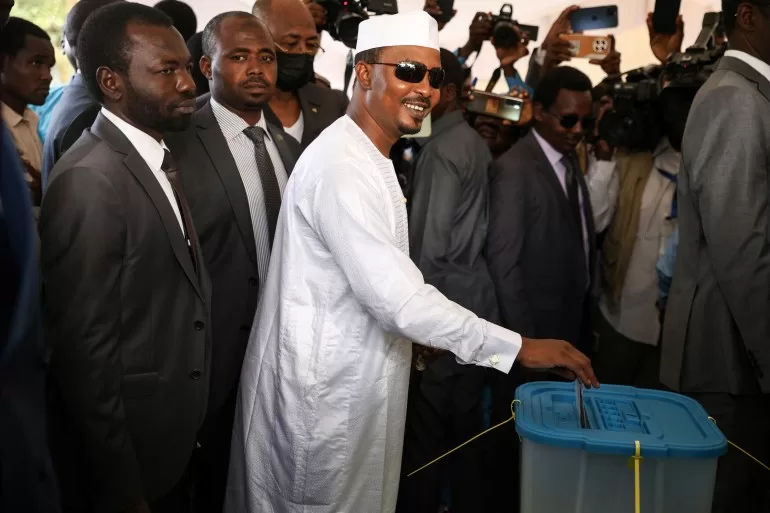Violence and questions of election-rigging, however, marred the provisional vote tally, which was announced earlier than expected.
Deby secured more than 61 percent of the vote, according to the numbers released on Thursday, eliminating the need for a runoff with his closest rival, Prime Minister Succes Masra, who received 18.5 percent.
The victory allows Deby, the incumbent, to hold onto the presidency with a voter mandate.
Previously, he led the country as its interim president, seizing power after his father, the late President Idriss Deby, was killed in April 2021 while fighting a rebel group in the north of the country.
But his rival in the presidential race, Masra, has already indicated he will not accept the election results.
Earlier on Thursday, Masra issued a live broadcast on Facebook declaring himself the winner. He also accused Deby and other government officials of rigging the election results to hold onto power.
“A small number of individuals believe they can make people believe that the election was won by the same system that has been ruling Chad for decades,” Masra said.
Deby’s father had led the country for more than 30 years, from 1990 to 2021, when he was shot to death shortly after his sixth presidential victory.
Critics have accused both him and now his son, the current President Deby, of stifling the opposition to maintain their grip on power.
They have also pointed to circumstances leading up to the May 6 presidential vote that could have swayed its outcome.
For instance, one of the leading opposition figures, Deby’s cousin Yaya Dillo, was killed when security forces engaged in a shootout at his party headquarters.
Other opposition figures have been barred from running over “irregularities” in their applications to campaign.
On Thursday, Masra called on his supporters and security forces to back his claim to the presidency and reject the election agency’s results.
“To all Chadians who voted for change, who voted for me, I say: mobilise. Do it calmly, with a spirit of peace,” he said in his Facebook broadcast.
Thursday’s results came earlier than expected, as the provisional results were originally thought to arrive on May 21.
Chad is considered the first of the military-led countries in Africa’s Sahel region to hold a democratic election, though questions about the vote’s fairness and credibility have endured.
Nearby countries like Niger, Mali and Burkina Faso have weathered coups that have left military leaders in charge of their governments, too. Eight coups have struck the region since 2020 alone.
This month’s presidential race was also the first time in the country’s history that an incumbent faced his prime minister in the polls.
Upon taking office in 2021, Deby pledged to hold “free and democratic elections” within 18 months – but his government extended the transition period until 2024, allowing Deby to remain in office in the interim.
During that time, he led a referendum on a new constitution that allowed him to mount his 2024 election bid.
A lifelong soldier, Deby led the powerful DGSSIE, an acronym for the General Direction of the Security Services of State Institutions. In that role, he worked closely with French troops.
Home to nearly 18 million people, Chad was under French colonial rule until 1960, and it remains the last country in the Sahel region to have a French military presence, with warplanes and troops stationed there.
In the wake of Thursday’s announcement, security forces were stationed at intersections throughout the capital of N’Djamena, in case of unrest.
